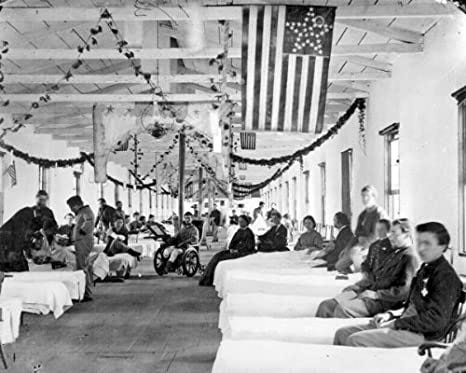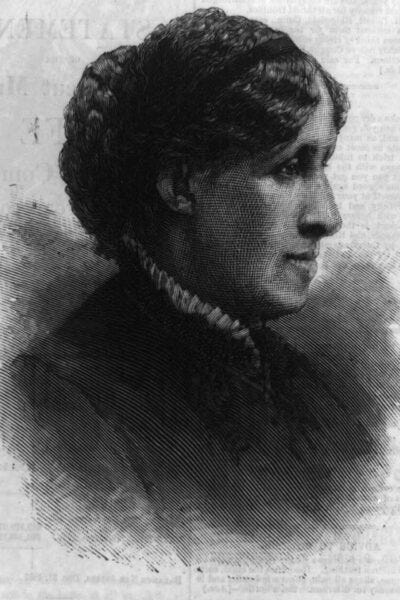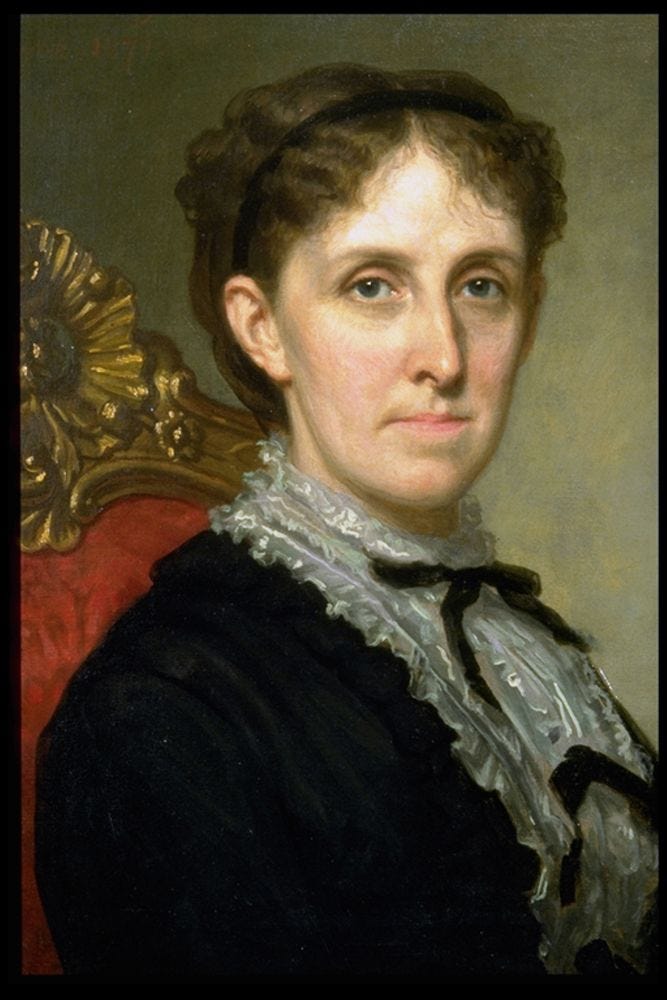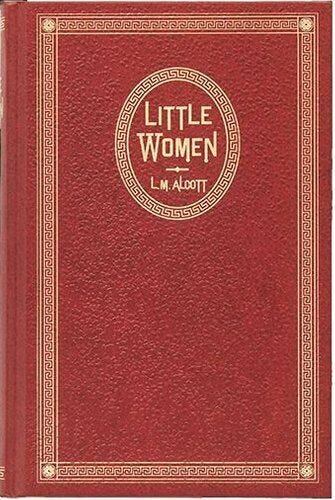Louisa May Alcott: “Little Women” Is Born
To Louisa’s irritation, fans clamored for romance. She was frustrated that young ladies of the time seemed to think marriage the only thing a girl could aspire for.
The Civil War began in 1861 and shook every person living in the country. It was the result of years of political tension, and its many battles resulted in appalling numbers of casualties.
Though only men could enlist as soldiers to fight in battle, there was still plenty for women to take care of. Mothers had to assume their husbands’ roles, all the while grappling with uncertainty about whether they would return. Shops and businesses were left in the hands of women for management.
Thousands of women took their roles of service a step further. They volunteered as nurses in special military hospitals, some of which were set up on the battlefield, exposing them to the strife. Even if they were not hit by bullets, these women risked contracting illnesses that soldiers brought from the field.
Though women were not given guns and uniforms, many heroes rose from among these volunteers who placed themselves in positions of danger.
Louisa May Alcott was never the sort of woman to sit around while her world fell apart. She wanted to be part of the drama, thinking battles must be romantic; since she could not enlist as a soldier because of her gender, she volunteered as a nurse at Washington’s Union Hospital.
Her service there would not last long; after only three weeks, she became ill with typhoid fever.
Louisa wished to stay in the hospital to continue serving her country. However, she had become another patient to tend to in a place teeming with them.
Seeing that Louisa was not going to improve, the ward matron (who was also suffering from typhoid fever and would pass away because of it) decided her service was complete. She sent a telegram to the Alcott family.
Days later, Louisa’s father arrived to escort her back to Concord. There was nothing she could do: as a nurse, she could not help patients if she was sick. She went home with a bitter taste in her mouth, frustrated that she was unable to continue serving her country.
Louisa was a changed person. She would never see the world as she had done before leaving home, having witnessed too much suffering in the faces of dying soldiers. At least she had tried to do her part. She was unable to remain at the hospital for long, but could find comfort knowing that she’d made an effort.
The war had stolen from Louisa the small amount of innocence she’d managed to nourish, having grown in a different kind of struggle. Due to her father’s unconventional lifestyle, she didn’t have the childhood she deserved; the Alcotts didn’t even have a house of their own during her tender years!
Perhaps she took up writing as an attempt to compensate for what she never had. Even her muse would be different after her brief time at Union Hospital. The stories she penned before were usually light-hearted, based on games that she and her sisters played as children.
Could Louisa ever write a happy story again? If once she’d had the ability to ‘wear rose-colored glasses,’ she’d been forced to remove them in order to see the human cost of war.
While the soldiers volunteered knowing death was a possibility, one could not help but grieve over the devastating loss of life and destruction of families. Countless wives and mothers who sent their men to war did not get their bodies back. So great was the carnage that the army resorted to using mass graves.
The Civil War might’ve been necessary for equality, but it broke thousands of hearts in the process.
Back at Orchard House, Louisa’s mother and sisters nursed her to health. For several weeks she continued to suffer from fever and hallucinations. Her beautiful hair had been cut off by nurses at the hospital so that she would not pull at it. She was pale, thin, and emotionally frail.
In spite of all this, she had never been anything less than a fighter, and soon she was near full recovery.
Louisa did not give herself time for self-pity. She might have been sent away ill from the hospital, but she could not afford to sit back and rest. After all, she was still the family breadwinner.
The moment she left her sickbed that spring, she threw herself into writing. Louisa wrote several short stories for newspapers. Later in life, she would pen thrillers with darker themes (using a different pen name, because the author of Little Women could not be associated with some of the subject matter in these stories; read about Louisa May Alcott’s thrillers in this excellent article).
Due to Louisa’s stubbornness, the novel Little Women almost did not come to be. It wasn’t her idea, but that of her publisher, Thomas Niles. The genre of childrens’ literature had become popular in recent years; he urged her to write one of her own, a book for little girls.
Louisa declined for a variety of reasons. PTSD might have been one of them; she had witnessed overwhelming death at the hospital, recovered from a horrific illness, and surely was in no mood to write something light-hearted.
She was also known for her mercurial moods, and seemed to have displayed the same behavior from childhood (Bronson kept a journal of her behaviors, though he blamed her behavior on wickedness). If she was in a depressive state, she might have found it particularly difficult to write a happy story for little girls.
Literary scholars have speculated that she struggled with bipolar disorder. It is hereditary; her father also had moments of mania, as did her uncle Junius, Bronson’s brother. Junius would go through manic highs and crippling lows until 1852, when he ended his life.
Instead of writing a story for little girls, Louisa completed and published a collection of short stories. Could it be that she was afraid of broaching the subject of death for children?
This seems unlikely, as she wrote about the topic in a letter:
"since even the…most guarded child cannot escape some knowledge of the great mystery, is it not well to teach them…that affection sweetens sorrow, and a lovely life can make death beautiful?"
Louisa would eventually introduce young readers to the reality of death with Beth’s illness. She did it so poignantly that I would call it one of the most famous storylines in literature.
Another possibility for Louisa’s reluctance is the nature of her own childhood, mixed with her not-quite-ladylike personality. In a letter to a friend, she confided, “I could not write a girls’ story knowing little about any but my sisters and always preferring boys.”
Though Louisa resisted the idea, Niles didn’t give up. Childrens’ literature had become wildly popular, and he believed that Louisa’s voice would produce a bestseller. He needed a story that would compete with other books of the time.
Louisa had shown her storytelling talent; he believed that, with a story penned by her, his publishing house would boast of a hit. He might not have realized at the time how correct his prediction would be: the book Louisa wrote for little girls would become immortal.
When Louisa continued to refuse, Niles tried a different approach. He kept his foot in the door by working with Louisa’s father, Bronson Alcott.
Bronson had taken to the pen after finishing another speaking tour. He had completed a manuscript for a spiritual book called Tablets, which was—as one could expect from him—on the subject of Transcendentalism.
Though Bronson spent years editing a Transcendentalist periodical called Dial, he hadn’t written a book since his disastrous attempt in 1837. That year, he published a volume called Conversations with Children on the Gospels. It received terrible reviews because of the way he wrote about Jesus, attempting to mix in different religions and ideologies.
Bronson hoped that his new book, Tablets, would be well-received. Following his experience with Conversations, he probably wouldn’t have gotten an opportunity if it wasn’t for Louisa.
It’s safe to assume that his ‘wicked’ daughter became an asset to him. She’d shown Niles that she was a talented writer with a knack for witty stories. Her name bore weight, and since Bronson was her father, Niles was willing to give him a chance.
I imagine that, during his chats with Bronson, Niles mentioned just by the way his idea about Louisa writing a childrens’ book.
Bronson soon joined Niles, urging Louisa to consider the idea. Perhaps Bronson feared that Louisa’s response to Niles’ request would decide whether his work would be published. Though this cannot be known for certain, there was some correlation.
After encouragement from her father—and likely a bit of guilt-tripping—Louisa decided to give Niles’ idea a try. Niles agreed to publish Tablets, and Louisa began the challenge of writing a novel aimed at little girls.
Louisa still had to grapple with the aforementioned problem of not having had a childhood. What would a child with a regular family like to read? Perhaps the greater challenge for her was what would little girls like to read? Of the four sisters, Louisa had always been rough around the edges, writing in her journal that she wished she’d been born a boy.
Having grown up with three sisters, Louisa used them for inspiration. She wrote Little Women by delving into her memories, revisiting people she had known and places she’d gone. She placed the spotlight on her sisters, giving the main characters traits parallel to those of Anna, Lizzie, May, and herself.
In a frustrating development, when Louisa presented the first portion of her draft to Niles, he pronounced it dull. (Perhaps he forgot that he was not the targeted audience).
As an author, I might have flung the manuscript at him. He’d pestered her so much, and now that she’d agreed to write the book, it was dull?
Louisa persisted with her manuscript. Once she fell into what she referred to as ‘the vortex’ of writing, she would lock herself away for days, coming out only to eat (and sometimes food had to be brought to her, instead). I imagine that she found Little Women therapeutic to write. It gave her the opportunity to explore difficult parts of her childhood, arranging them into something happier.
It also gave her creative freedom to add the brother she had always longed for, in the character of Laurie. Later, she would reveal that Laurie was inspired by a Polish man she met during a visit to Europe. Passages in her journal hint there might have been romance between them, but it is unclear how far that romance went, since she was older than him.
Louisa finished Little Women and presented the final draft in June of 1868. Niles showed the manuscript to several little girls, as they actually were the targeted audience. All of them approved of the March sisters’ story.
To Louisa’s irritation, fans clamored for romance, asking whom each of the sisters would marry. She was frustrated that young ladies of the time seemed to think marriage the only thing a girl could aspire for. She was faithful to her resolution of not marrying, but catered to her audience by giving Jo a husband who was decidedly not Laurie.
Little Women was such a success that soon there was a sequel titled Good Wives. This would be followed by a series of stories following the same family, including Jo’s Boys.
The world couldn’t get enough of the March family, and Louisa finally achieved the fame that she had dreamed of as a little girl, though it made her nervous; she did not know how to behave with it.
The success of Little Women was bittersweet to Louisa. She would spend the rest of her life trying to write a novel that she could be proud of, even though she had already caught the world by storm with her story for little girls. She didn’t want to be known as an author of children’s books. However, she could not use her name to move into the territory of darker subject matter—hence her secret thrillers.
Her inability to write about darker subjects would lead to her feeling trapped, but that is the price of fame. Little Women was wildly successful, even if the author was not happy with it.
To this day, most children can list Little Women as one of the first stories they learned when they began to read. We are all familiar with the March sisters; Little Women is a favorite novel to curl up with on cold winter nights.
Perhaps we should thank Thomas Niles, or even Bronson, for having pestered Louisa so persistently to write her story for little girls.
Next week, I will publish my last post about Louisa May Alcott (for now), because the book club is reading Charles Dickens for December.
I’m ever so grateful for the deep dive I took into Louisa May Alcott’s history. Like Mary Shelley, she was a formidable woman with great ambition and thick skin in a world that often got in her way.
It’s a good thing that Louisa May Alcott wrote so much; even after I finish Little Women, I’ll still have plenty by her to read.
Click here to join our online book club, so that you can join us for the month of December. Thank you for reading along with my posts as I got to know the Alcott family!
Author’s Note: If you’re enjoying my articles, consider supporting me as a writer by checking out my historical fantasy novels, The Sea Rose and The Sea King. Book one is currently 99c; book two is $3.99. They are both available on KU! ($3.99 can buy a used book as a resource, so I can continue writing articles for you!) Thank you for your time and continued support!
Abigail May: The Alcott Who Got Away
There will always be disputes among siblings. As children grow and achieve their personal goals, jealousy can—and often does—drive a wedge between them. It can cause grievous strain on the siblings’ relationships. This seems to have been the case with the Alcott family.









I loved this 🫶🏻 I honestly can’t imagine writing what I don’t like/cant relate to. I’ve tried and it just doesn’t come out, or it comes out a total mess. She sounds like a formidable woman!
So interesting, Mariella! I must admit, I never was drawn to classics 'like' Little Women, as my mom reared me more on darker-themed fiction, but it's true, the March sisters are such a part of our culture, I know their personalities and story as if Alcott's story had been a part of my childhood!